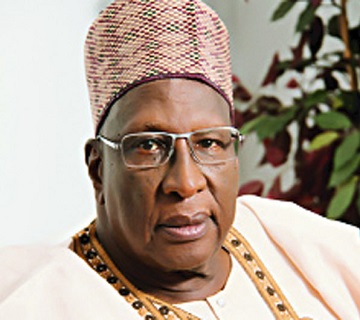At long last, the embattled Chairman of the People’s Democratic Party, PDP, Bamanga Tukur got the boot today (Thursday) as he reportedly stepped down from his position.
The announcement was made by President Goodluck Jonathan, at the PDP National Executive Council meeting. He said that Mr Tukur’s decision was based on mutual agreement. He also made it clear that the former Chairman was not found guilty of any offence.
However, the extent of the storm that has hit Tukur’s office has been seen to have left the party in a rather devastated state.
When he emerged at the party’s March 2012 convention to take over from Abubakar Baraje, who acted in that capacity for about four years, many believed he was tipped to satisfy some interests.
Mr Tukur, who was the Governor of the defunct Gongola State, has seen some of the biggest crises ever witnessed by the PDP. It was under him that most of the National Working Committee positions were declared void by the Independent National Electoral Committee, INEC, which led to the National Convention in October 2013. It was at the event that the group of seven aggrieved governors of the party staged a walk out.
That again may be the first time such powerful delegation would openly walk out on a convention with a seating president in attendance. The walk out of the aggrieved governors also saw the emergence of a faction of the party, which was widely referred to as the new PDP.
That crisis appears to be primarily the root of the troubled times that characterised the exit of Bamanga Tukur.
Five of the seven aggrieved governors of the PDP have since moved to the opposition party, All Progressives Congress, APC, followed by 37 lawmakers, dealing the ruling party a big blow as more influential members of the party also threatened to defect.
Critics of Bamanga Tukur’s leadership style of leadership have accused him of tearing the party apart.
When Tukur assumed the chairmanship position, there were 23 governors. As he steps down, the party is left with 18 governors. Two of those 18 governors who are left in the party had threatened to leave too.
In the National Assembly, when Tukur took charge of the PDP, there were 208 members of the PDP but 37 have defected, and the opposition has since taken the majority.
It is the first time the PDP, in its 14 years of existence, would lose the majority number in any arm of the National Assembly.
For the Senate, the underground current seems not to be a positive one too.
Moving Forward
The next chairman of the party faces the task of pulling the party together and convincing those who had left to return to the fold. A view a former Attorney-General of the Federation, Richard Akinjide, also holds very strongly.
Bamanga Tukur’s successor would be expected to make sure the party stands strong in the face of an impending bashing from the fast-rising opposition party, the APC.
Also, a new successor must make sure the party is well prepared for the all-important 2015 elections with the image of the party and its structure re-aligned for the task.
From history, only a few PDP chairmen have enjoyed a smooth run of their tenure.
From the very first Chairman, Solomon Lar, to Barnanbas Gemade and then Audu Ogbeh who took over from him in 2001, and Ahmadu Ali, who became the chairman and spent about four years, the rest have stayed few weeks, others few months, while Bamanga Tukur lasted for just about a year and nine months.
The choice of the new chairman is another big task for the party, considering the power and influence embedded in the position. Another candidate would perhaps emerge from the North East zone. What is yet to be seen is how the next chairman would fare in the face of daunting challenges.
A new Chairman is to be presented to the National Executive Committee, which is to reconvene on Monday, January 20, for their approval.



